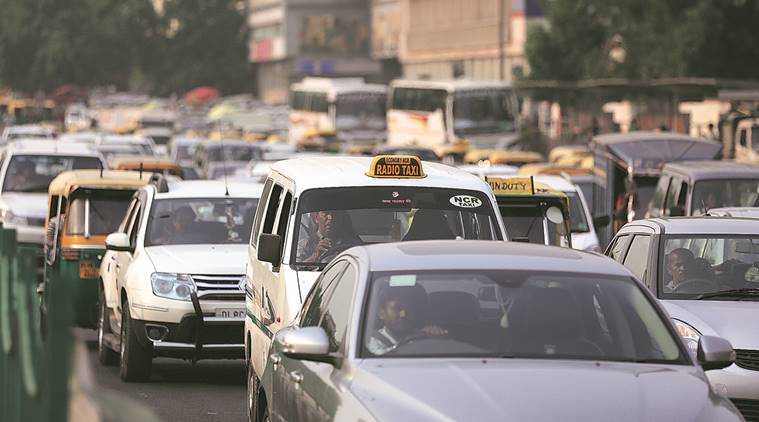Stay updated with the latest - Click here to follow us on Instagram
Delhi HC ends surge pricing: Cab operators can’t charge more than fares fixed by govt
Radio cab operators had initially sought one month’s time to modify the software, but the court refused to allow further time.
 The notified fare of radio taxi cabs is Rs 23 per km. Additional night charge or 25 per cent of the fare is applicable between 11 pm and 5 am.
The notified fare of radio taxi cabs is Rs 23 per km. Additional night charge or 25 per cent of the fare is applicable between 11 pm and 5 am.
‘Surge pricing’ will soon be a thing of the past, after the Delhi High Court Thursday directed that cab operators — including app-based cab services such as Ola and Uber — cannot charge more than government-stipulated rates after August 21.
While the detailed order is likely to be released by Saturday, the bench of Justice Manmohan has made it clear that it will not allow further delay by cab operators.
After the counsel for Uber sought time to make the appropriate software modifications, the bench granted 10 days for app-based cab operators to “modify” their app platforms.
Radio cab operators had initially sought one month’s time to modify the software, but the court refused to allow further time.
The bench suggested that the committee constituted by the central government in May this year — to create rules for licensing of cabs and cab operators across India — should be expanded to include representatives from the Niti Aayog, Delhi Traffic Police and the Central Pollution Control Board. The committee is expected to give a hearing to all stakeholders, including cab operators, while formulating the policy.
The bench directed the committee to look into the draft model law by the Delhi government to regulate app-based cab operators, and come up with appropriate “draft model rules for app-based radio taxi operators” within three months.
The directions have been issued in response to a batch of petitions filed by the Association of Radio Taxis and Ola Cabs owner ANI Technologies.
According to the rates prescribed under the Delhi government’s radio taxi scheme, fare for economy radio taxis is Rs 12.50 per km, while it is Rs 14 per km for non-AC black-and-yellow top taxis and Rs 16 per km for AC black-and-yellow top taxis.
The notified fare of radio taxi cabs is Rs 23 per km. Additional night charge or 25 per cent of the fare is applicable between 11 pm and 5 am.
On Tuesday, the bench had said a “good and model” law was needed for regulating app-based cab services, such as Ola and Uber, as it would be “helpful to people and bring in more clarity”. However, Ola and Uber had informed the court that they were not charging beyond the government rates, and had “already suspended” peak pricing.
In April, when the odd-even plan was in force, the Delhi government had filed several petitions against “unfair peak time pricing” by Ola and Uber. The government had alleged that the two services had charged “up to five or six times” the fare. The government had also raised objections to “peak pricing” by the two cab operators in January.
One of the pleas had alleged, “Attracting a prospective passenger with a published fare as low as Rs 5 per km but charging the passenger as high as Rs 38 per km in the name of ‘peak time charge’ or ‘surge pricing’ is downright misleading, mischievous and cheating”.
In April this year, a different bench of the High Court had directed the Delhi government to take action against surge pricing, observing that the government could not “wash its hands off and fail to take action” while “people are suffering”.
While both Uber and Ola refused to comment on Thursday’s High Court order, competitor cab service Meru welcomed the order and compared the practice of surge pricing to “black-marketing”.
Rahul Kapani, director of Meru Cabs, said, “This is remarkable… surge pricing was effectively a way of black-marketing and we are happy that the court has upheld the law of the land and taken a decision in the interest of customers…”
On the final fare to be charged by cabs, government sources said, “We will form a committee… and decide on the fare chart for cab aggregators by next week. Fares may vary between Rs 12/km to Rs 23/km.”
Road to High Court directive
* April 27: CM Arvind Kejriwal bans surge pricing after commuters complain of exorbitant rates being charged by app-based cab services during odd-even phase II. CM warns Ola and Uber of strict action if they are caught violating the ban. Both companies suspend surge pricing immediately
* May 1: Uber found levying surge pricing again. Ola, however, does not impose any surge pricing. Government impounds 400 cabs between late April and May to drive home its point
* May 7-10: Government issues 13 challans to Uber co-founder and CEO Travis Cordell Kalanick, Uber India president Ankit Jain, and general manager for Uber North India Gagan Bhatia, under Section 93 of the Motor Vehicles Act for acting as travel agents for 13 cabs caught plying illegally. A Dwarka court takes cognizance of the challans and summons the three
* May 20: Uber falls in line, tells government it is ready to cap its fares and not exceed government-prescribed rates of Rs 23 per km for radio taxis








